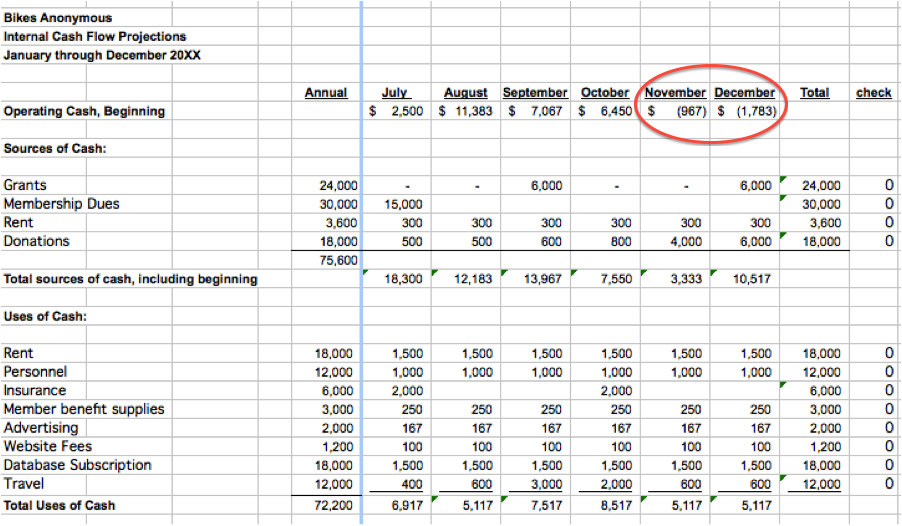Most of us come to biking and walking advocacy work out of a passion for healthy, sustainable transportation and recreation options, rather than a deep love of number-crunching, so bike/ped organizations sometimes can find themselves challenged in the financial realm. Plus, some smaller organizations and bike clubs have just one or two paid staff -- and some would consider themselves lucky to have even that. February’s Distance Learning Webinar helped our member organizations determine where to focus their time and energy to establish trouble-free financial management and accounting procedures.
Note to Alliance members:The recording and extended tipsheet from this webinar are available in the Resource Library. Please log in to gain access to the Resource Library. Email This e-mail address is being protected from spambots. You need JavaScript enabled to view it if you have questions on how to log in.

Our two finance experts -- Anne Hagen, CPA, CGMA, Chief Financial Officer of the Masonic Home of Virginia, and Bill Brown, CPA, Partner at Holland & Brown CPAs, PLLC -- with decades of experience in the field of non-profit and for-profit accounting between them, made complex reporting rules simple.
Only 63 percent of webinar attendees said their organization is subject to an audit, but Anne emphasized that every organization should always operate as if it’s being audited.
Who Should Prepare Your Budget? Budgeting can be done from the bottom up (by the staff and/or volunteers) or from the top down (by the executive). It’s best for both groups to do it and come together to create a final product. You can hire a professional to do your budget, but it’s best for the staff/volunteers to be part of it so they’re engaged and bought in to accomplishing that budget.
Cash Is King! The first thing you should do every day is deposit cash in the bank. It’s hard enough getting money in the door; you don’t want to having to explain that you’ve lost the check.
Manage your account balance regularly; every day if you can. Make sure you know what’s cleared. Pay bills on a regular basis, not early or late. Make sure to look ahead to see when cash flow could go negative, and plan strategies for managing it.

Key roles for non-financial staff. Non-financial staff (and top volunteers) are the initial step in the budget process, providing raw information and advice to decision makers about what the organization is going to try to do in the coming year.
During the year, while non-financial staff are in the trenches doing program work, they should provide routine reports on what they’ve done, what was achieved, what problems and opportunities arose in course of performing duties.
Internal controls. Conflicts of interest could lose you your tax-exempt status. It’s essential to acknowledge gifts of $200+ in writing and in a timely manner so donor can claim deduction on taxes.
Two important features of good internal controls: 1) trustworthy, competent personnel and 2) separation of duties. Small organizations have difficult separating conflicting duties. Cash receipts and disbursements should ideally be done by two different people, and within those functions there should be separations: The person preparing the check ideally shouldn’t be the person with signature authority. People with signature authority shouldn’t have access to blank checks.
The reality is that many small organizations have one bookkeeper who performs all accounting and treasurer functions. So how can an organization ensure that cash is being spent and recorded the way it should be? A senior staff or board member may have to take a limited financial role in the organization.
Reimbursement for expenses: Tax law requires you to either require employees and volunteers to provide documentation for reimbursements, or you as the employer or user of those services have to put the amounts on that person’s W2 or 1099 as taxable income, and they can take a deduction on their own tax return (if they can justify it).
Audit preparation. Auditors are looking for a good system of internal control. Minimize the time the auditor needs to spend to make sure everything is in order (lowers the audit fee) and minimize bad surprises the auditor receives and then turns around and hands to you. To do that, have your books and supporting documents up to date and well organized. (Not only will that keep the auditor happy, but it’ll also ensure you have the information you need when you’re making decisions about how to construct next year’s budget.) Auditors will only ask for supporting documents on a case by case basis.
All key personnel (senior and mid-level staff, senior volunteers) should be well informed of topics of interest to an auditor. Auditor might ask them, for example, about the organization’s policy on expense reimbursement: They should know and it should be simple. “I’ve got to turn in a receipt and explain the purpose of the expenses.” For questions that support staff can’t answer, they should at least know who can.
A note on your 501(c)3 status. Nonprofits and charitable orgs need to follow specific rules to maintain tax-exempt status. Acknowledgement of contributions of $200+ is critical. Conflicts of interest are dangerous to the organization and to the individual who improperly benefited. An organization can also lose its exempt status by engaging in other activities that don’t meet the organization’s exempt purpose, like getting involved in political campaigns. A 501(c)3 can’t endorse or spend money on a political candidate without risking its status. Lobbying is prohibited, though educating people is permitted. Always keep in mind the exempt purpose stated in your founding documents filed with the IRS and state government.
Join us for our next webinar: "Collaborations, Mergers, and Strategic Alliances," Wed., March 18 at 2:00 p.m. EST. Presenters: Tom McLaughlin, author of the book, "Nonprofit Mergers and Alliances," and founder of the nonprofit-oriented consulting firm McLaughlin & Associates (which specializes in collaborations, strategic positioning, and business planning); and Mark Goldstein, CEO of Communication Mark, which provides grant writing and other solutions for nonprofits.
Note to Alliance members:The recording and extended tipsheet from this webinar are available in the Resource Library. Please log in to gain access to the Resource Library. Email This e-mail address is being protected from spambots. You need JavaScript enabled to view it if you have questions on how to log in.

